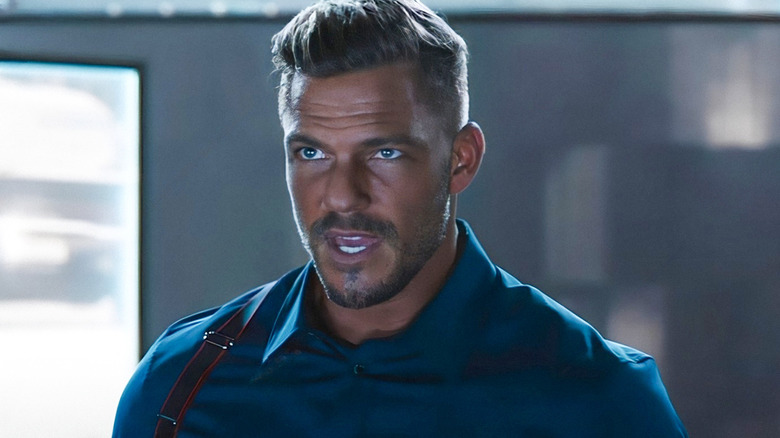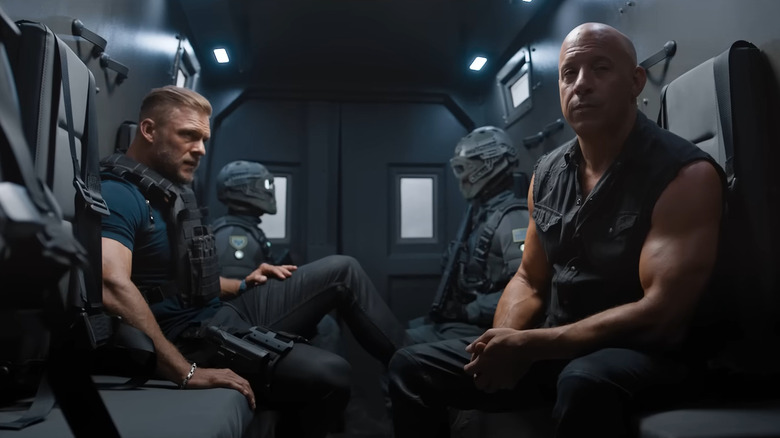Alan Ritchson Brings His Jack Reacher Muscle And A Meta Perspective To Fast X
This post contains spoilers for "Fast X."
When Alan Ritchson was first announced to be starring in the new "Fast and Furious" movie, it wasn't a huge surprise. The guy's now famous for playing Jack Reacher, a former military police officer who goes around kicking ass and taking names. Much like "Fast" franchise protagonist Dominic Toretto (Vin Diesel), Jack Reacher might seem cold and scary at times, but he's got a soft side that makes viewers root for him. By all accounts, Ritchson should feel right at home in this franchise.
Ritchson's inclusion makes even more sense once his "Fast X" character — Aimes, the new head of The Agency — starts interacting with Dom in person. It's clear that Aimes isn't going after Dom because he's evil, but because he has a different moral code and he sees Dom's methods as outdated. Aimes captures Dom, and soon after they're both attacked by Dante (Jason Momoa) forcing them to unite against their common enemy.
If that sounds familiar, that's because it's basically the sped-up version of the same arc that happened with Hobbs (Dwayne Johnson) and Dom in the fifth and sixth movies, in which the lawman reluctantly teams up with the criminal with the heart of gold, and they slowly develop an understanding. Throughout the first two-thirds of "Fast X," the role of Aimes clearly seems to be as Hobbs' replacement, which is what makes Aimes' big reveal (that he's been on Dante's side this whole time) actually sort of surprising. It's silly, sure, but the film's positioning of Aimes as Hobbs 2.0 serves as a decent misdirection. This movie isn't just aware of what audiences have come to expect from this series; it plays around with those expectations too.
The meta commentary
It's fitting that so much of Aimes' character arc takes advantage of the audiences' knowledge of the real-life falling out between Dwayne Johnson and Vin Diesel, which is what seemingly would've led to the franchise creating a replacement for Hobbs. After all, Aimes is a uniquely meta character from the moment he's introduced. His first scene lets him give a bewildered, self-aware monologue about how improbable the adventures of Dom's crew have been up until this point.
"If it can be done in a car, they did it," Aimes says. "If it violates the laws of god and gravity, they did it twice." He complains about the escalating scale of their adventures, as well as their ongoing tendency to let previous villains become a part of their family. Basically, Aimes' monologue is a big, extended wink to the audience.
It's fun, but it raises the question: is getting more explicitly meta the right choice for this franchise? These movies have always been fairly self-aware of how silly their storylines and action scenes are, but it's only in these past two movies that the characters themselves have started directly talking about it. It's easy to see how the writers would want to make it clear they're in on the joke, but it's harder to feel invested in the story when characters like Aimes and Roman are constantly on the verge of realizing they're in an action franchise.
"Fast X" sets up what should be a tense, climactic eleventh film, one that'll presumably want its audience to genuinely worry again about the main characters' safety. So, as fun as Aimes' meta-commentary was in "Fast X," let's hope it doesn't escalate too much further from here.
"Fast X" is currently in theaters.

